PRINCETON, NJ -- About half of Americans, 52%, say the effects of global warming have already begun to happen, consistent with views since 2009. However, this remains down from prior years, when as many as 61% believed global warming was already manifesting itself.
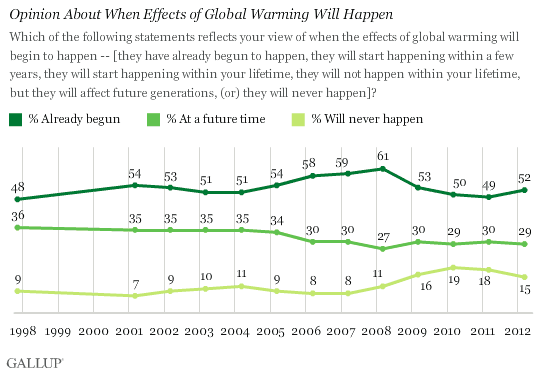
Today's level of belief that global warming is already apparent is similar to what Gallup found in 1997 and from 2001 through 2005. During those periods, however, somewhat fewer than today's 15% said its effects would never happen.
The view that global warming is already causing a rise in sea levels and affecting weather and rainfall around the world is central to climate-change researchers' and others' concerns about the issue.
While barely half of Americans agree that the effects of global warming are already manifest, an additional 29% say the effects will start to happen within a few years (4%), sometime in their lifetime (10%), or sometime further into the future (15%). Fifteen percent of Americans say the effects will never happen.
These findings are from Gallup's annual Environment poll, conducted each March since 2001. This year's update was conducted March 8-11.
Skepticism of Media Coverage Remains Heightened
The same poll finds the slight majority of Americans saying the news about global warming is either correct (24%) or underestimates its seriousness (31%). Still, at 42%, the percentage saying the media exaggerate the seriousness remains higher than it was for much of the past decade, although down from the 2010 high point, when it reached 48%.

Americans' belief that the media exaggerate the seriousness of global warming rose sharply between 2006 and 2010, mainly because of a shift in Republicans' and independents' views. Democrats also grew a bit more skeptical during this period, but never more than 25% held this view.
Since 2009, two-thirds of Republicans have continued to say global warming news is exaggerated, while independents' skepticism has eased slightly, as has Democrats'.
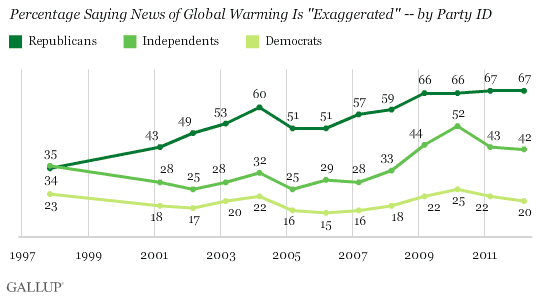
More Blame Human Activity Than Natural Environmental Changes
Much of the controversy over global warming concerns its cause, not whether a measurable increase in the earth's average temperature has, in fact, occurred. A slight majority of Americans, 53%, say global warming is caused by pollution resulting from human activities. Forty-one percent believe it stems from natural changes in the environment.
This 12-percentage-point spread in views is slightly wider than what Gallup found in 2010, when Americans were more evenly split on the question; however, the lead for the human activities position is still not as wide as was found from 2003 through 2008, when it stretched to as much as 28 points (61% vs. 33%).
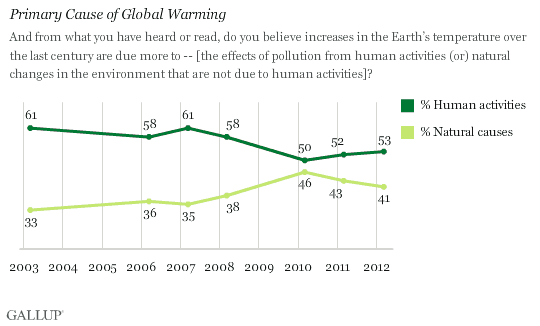
Majority Perceives a Scientific Consensus on Global Warming
One of the more contentious battles in the politics of global warming involves the perceived scientific consensus. Those promoting global warming as a serious problem have declared the issue settled, arguing there is no serious scientific claim against the evidence for man-made climate change. Global warming skeptics point to scientific dissenters and try to debunk predictions of catastrophic consequences of global warming made by some, while promoting the more benign effects described by others.
When asked to weigh in broadly on this debate, the majority of Americans say most scientists believe global warming is occurring. By contrast, 7% say most scientists reject the existence of climate change, while 32% say most scientists are unsure. At the same time, fewer Americans today believe there is a scientific consensus than did so during the 2000s, when at least 6 in 10 held this view.
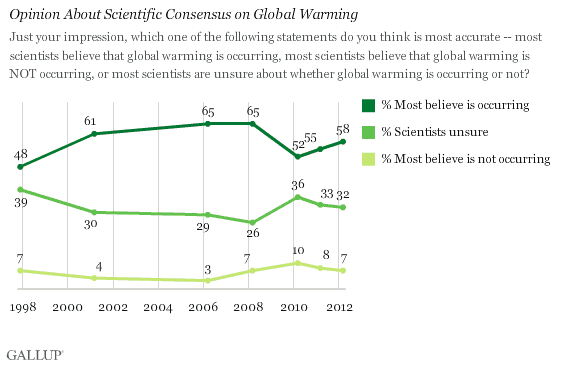
Independents and Democrats Tilt Toward Acceptance
Across all four Gallup measures of views on global warming, the majority of Americans lean toward believing in it. Independents' views are similar to the national averages, while much larger percentages of Democrats are supportive. Republicans, on the other hand, are largely skeptical.
The highest support for global warming claims among Republicans is seen on the scientific consensus question, with 43% saying most scientists believe global warming is happening. Republicans' agreement is much lower on the question of news reports about global warming, with 31% saying those reports are accurate or underestimate the problem.
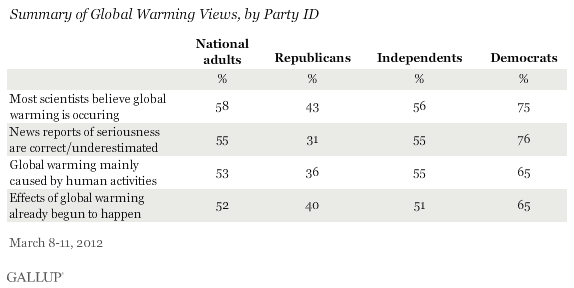
Bottom Line
The slight majority of Americans support global warming as valid on a number of measures. And after peaking in 2010, public skepticism about global warming softened slightly in 2011, and remains at the lower level this year. Nevertheless, Americans remain less certain about the accuracy of global warming news coverage, about humankind's role in causing global warming, and about the scientific consensus on the issue than they were last decade.
Some shift in Americans' global warming views might have been expected this year, given the near-record warm temperatures experienced this winter across much of the country -- Gallup finds 79% of Americans reporting that the weather in their area was warmer than usual, though less than half of these attributed this to global warming.
However, the fact that belief in global warming did not increase markedly suggests Americans are basing their perceptions more on the debates over scientific evidence than on the weather outside their front door.
Survey Methods
Results for this Gallup poll are based on telephone interviews conducted March 8-11, 2012, with a random sample of 1,024 adults, aged 18 and older, living in all 50 U.S. states and the District of Columbia.
For results based on the total sample of national adults, one can say with 95% confidence that the maximum margin of sampling error is ±4 percentage points.
Interviews are conducted with respondents on landline telephones and cellular phones, with interviews conducted in Spanish for respondents who are primarily Spanish-speaking. Each sample includes a minimum quota of 400 cell phone respondents and 600 landline respondents per 1,000 national adults, with additional minimum quotas among landline respondents by region. Landline telephone numbers are chosen at random among listed telephone numbers. Cell phone numbers are selected using random-digit-dial methods. Landline respondents are chosen at random within each household on the basis of which member had the most recent birthday.
Samples are weighted by gender, age, race, Hispanic ethnicity, education, region, adults in the household, and phone status (cell phone only/landline only/both, cell phone mostly, and having an unlisted landline number). Demographic weighting targets are based on the March 2011 Current Population Survey figures for the aged 18 and older non-institutionalized population living in U.S. telephone households. All reported margins of sampling error include the computed design effects for weighting and sample design.
In addition to sampling error, question wording and practical difficulties in conducting surveys can introduce error or bias into the findings of public opinion polls.
View methodology, full question results, and trend data.
For more details on Gallup's polling methodology, visit www.gallup.com.
